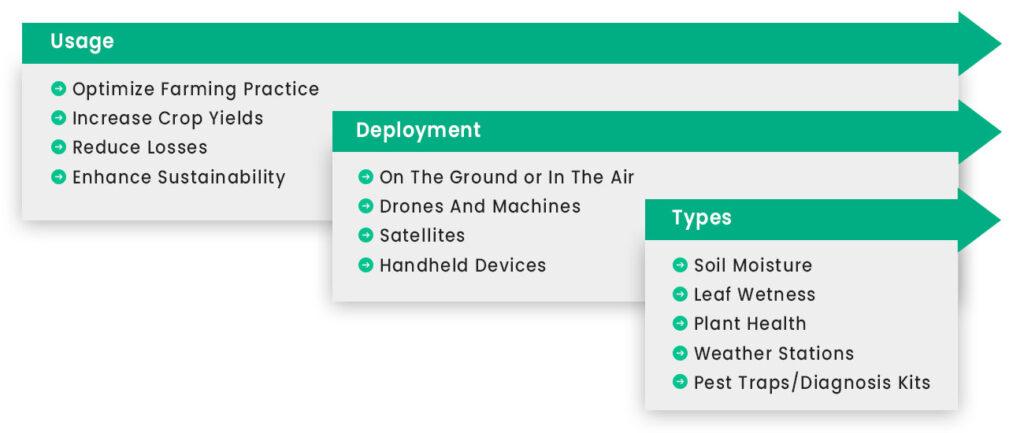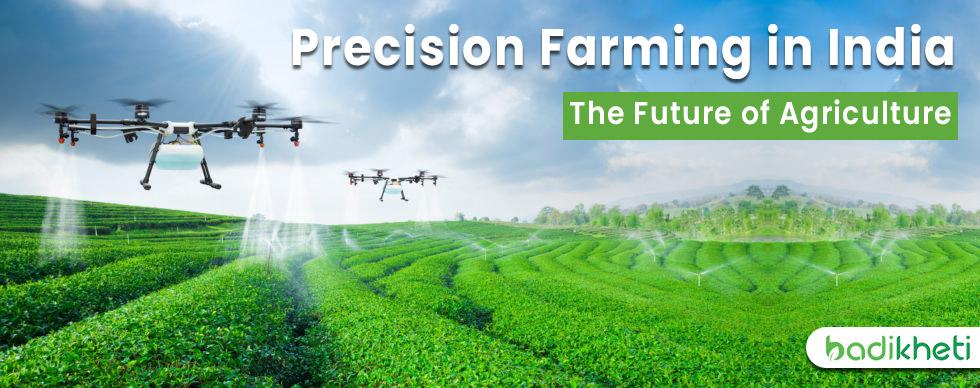It has been close to eight decades since India became an independent country. Back then, agriculture drew the country’s economy and there is no surprise that today the same sector has a large chunk in contributing to India’s GDP. India is still the world’s largest and most diversified country with traditional and scientific agricultural practices.
Why do we need agricultural technology for Indian farming?
Agricultural development practices through technology have been a great initiative by the Indian government in order to save crops from natural and manmade disasters such as floods, droughts, insect attacks, and spoiled soil, air, and water. Exponential growth in the Indian population has pushed tremendous demands for food while the area for farming lands has remained limited.
Hence, there is a grave need in improving Indian farming to sustain the ever-growing demand for crops; additionally, Indian farmers are encouraged to use agritech for seeding, sowing, and cropping the produce.
Agritech is at its peak in Indian agriculture precision farming
The agricultural technology in India grew manifold between 2013 and 2020 as it came from just 50 startups to more than 1000 due to increased farmer awareness and agricultural education. The rising internet penetration in rural India has fueled the farming sectors across the nation, according to research.
With the advent of mobile technology, Indian agriculture technology has grown by leaps and bounds, especially in the past few years. The use of digital technology in precision farming has improved crop yields by using various gadgets, devices, machines, and sensors is not uncommon among Indian farmers.
Here is the list of agrotech that has revolutionized Indian precision farming.
Mechanization of Indian agriculture
Manual procedures and labor used in Indian farming have limited outputs in terms of the final quantity and quality of crops, especially in the topical areas of the country. Machines that are engineered on the basis of ergonomics and scientific principles have helped Indian farmers go a step further in cultivating several crops and yield great benefits. High-end tractors, crop removers, planters, and irrigation machines have, directly or indirectly, helped agriculturists in India with their better efficiency and productivity in precision farming.
AI for weather prediction and more
The use of Artificial Intelligence technologies in devices and gadgets has enabled farmers and agriculturists to predict climate change or weather alteration; the forecasts can make Indian farmers plan their sowing and watering in precision farming accordingly. They can also take precautionary measures in case where there is extreme weather announced. AI-enabled machines such as drones, and remote sensors gather crucial data from satellites as they keep watch 24/7 on cloud patterns and any circulatory pressure generated from oceans to predict weather abnormalities.
Artificial Intelligence also enables Indian farmers to improve their productivity, profitability, and sustainability. It can enable data-driven decision-making, optimize resource allocation, enhance crop quality and yield, reduce losses and risks, and increase market access.
Some of the applications of AI in Indian agriculture are:
- Precision farming and smart irrigation: AI collects data from sensors, crop models, weather forecasts, and soil maps to have accurate recommendations for harvesting, fertilization, pest control, and irrigation. Indian farmers can thus optimize their farming practices for more crops while reducing water wastage and saving energy.
- Crop and livestock management: Artificial Intelligence can combine the use of computer vision, ML, and NLP to track or trace crops’ and animals’ whereabouts, diagnose anomalies, predict crops, and provide customized suggestions. This can help Indian agriculturists enhance crop quality and quantity, improve animal welfare, and earn more profits.
- Market linkage and value chain: Various government and non-government bodies and agencies are into creating awareness among Indian farmers. The latter will be further trained to use AI for big data analytics, blockchain, and e-commerce platforms. This ultimately will connect farmers with potential buyers, big food-chain suppliers, aggregators, processing companies, and retailers; therefore, farmers would access real-time market information along with reduced transaction costs, and increased transparency and traceability.
Biotechnology in Indian farming
Biotechnology, the application of biological processes and organisms, improves human lives. In Indian agriculture, biotechnology has been used for various precision farming such as –
- Enhanced crop productivity
- Pest-resistant varieties
- Improved soil fertility, and
- Biofuel production
Biotechnology in Indian farming helps address the challenges of weather change, food security, and rural development across the country.
Some examples of biotechnology applications in Indian agriculture are:
- Biofertilizers: These are microorganisms used to fix atmospheric nitrogen or solubilize phosphorus thus making them available for crops. Biofertilizers are known to bring down chemical fertilizer dependency yet improve soil and plant health.
- Bioethanol: This is a renewable fuel produced from biomass like switchgrass, sugarcane, and/or corn. The use of bioethanol reduces greenhouse gas emissions and provides a substitute source of energy in rural India.
- Biopesticides: These are biological agents to control pests and diseases in crops without having any adverse impact on the environment. Derived from natural sources like animals, plants, insects, and microorganisms, biopesticides offer ample benefits over chemical pesticides. They are biodegradable and selective thus compatible with other pest management practices, and safer for farmers’ health and non-target organisms. Some examples of biopesticides used in Indian agriculture are neem, bacillus thuringiensis, trichoderma, and metarhizium.
By using quality organic seeds, maintaining soil health, and assuring suitable irrigation through various agrotech techniques, Indian farmers can avoid expensive and hazardous chemical inputs while enhancing soil fertility and crop quality through biodiversity.
Sensors in Indian agriculture
Sensors in Indian agriculture are devices used to keep vigilance on various parameters of crops, soil, water, weather, pests, and diseases in order to carry out precision farming.
Sensors are used to:
- Optimize farming practices
- Increase crop yields
- Reduce crop, water, and fertilizer losses
- Enhance overall sustainability

Sensors in Indian farming practices can be deployed in different ways, such as:
- On the ground or in the air
- On drones and other machines
- On satellites
- On handheld devices such as mobile phones
Some examples of sensors in Indian agriculture are:
- Soil moisture sensors
- Leaf wetness sensors
- Plant health sensors
- Weather stations
- Pest traps
- Disease diagnosis kits
Other general uses of agriculture sensors include communication or vigilance on plants and livestock in order to keep them under control and in good health. Today, advanced sensors are based on wireless connectivity and Indian farmer can get updates on their mobile phones. They can also operate various agriculture equipment and machines through their handheld devices with the help of sensors.
The agrotech forecast for Indian precision farming
Indian farmers face many challenges including natural calamities i.e., climate change, water scarcity, soil degradation, pests, and diseases that ultimately lead to low productivity; nevertheless, there is great potential for agritech to improve crop yields with its various applications.
Combined efforts from the Indian government, Indian agricultural marketplaces such as Badikheti, and agriculture eCommerce companies that sell bioinsecticides and other products at cost-effective rates can help farmers to increase their yields, reduce their farming costs, enhance their quality, and access new markets. There is no doubt that the future of Indian agriculture is bright with agriculture technologies, as they can transform the sector and make it more sustainable and profitable through precision farming.



